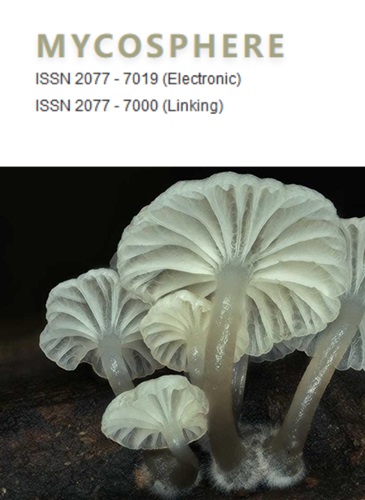昆虫病原真菌的多样性、分子定年及祖先特征重建
IF 15.1
1区 生物学
Q1 MYCOLOGY
引用次数: 1
摘要
本文章由计算机程序翻译,如有差异,请以英文原文为准。
Diversity, molecular dating and ancestral characters state reconstruction of entomopathogenic fungi in Hypocreales
Hypocreales (Sordariomycetes, Ascomycota) is a highly diversified order, with more than 1000 entomopathogenic species being reported in Clavicipitaceae, Cordycipitaceae, Ophiocordycipitaceae and Polycephalomycetaceae. Taxa in these families form intimate associations with members of up to 13 orders of Insecta and other arthropods. Their variable morphological characteristics along with the host affiliations have played important roles in the classification of entomopathogenic species. However, it is still unclear whether these morphological characteristics are informative at the family, genus or species level in a phylogenetic context. This study focuses on entomopathogenic taxa collected from Thailand and Southwest China. Thirty-six species belonging to the above four families were identified using morphology and phylogeny inferred from combined data of LSU-SSU-5.8S-tef1-rpb1-rpb2 sequences. Among them, Pleurocordyceps ophiocordycipiticola is a new species. Divergence time estimates indicated the crown age of Hypocreales at 200 Mya, while that of Clavicipitaceae was at 107 Mya, Cordycipitaceae at 129 Mya, Ophiocordycipitacae at 121 Mya and Polycephalomycetaceae at 74 Mya. Based on ancestral character state reconstruction, the ancestral ecologies of Clavicipitaceae, Ophiocordycipitaceae and Polycephalomycetaceae were animal-based, while that of Cordycipitacae was fungi-based. Multiple interkingdom jumps occurred in all entomopathogenic families. Mapping of morphological characters on the phylogeny identified cases of association of perithecial arrangement and stromal texture. Ascospore and secondary ascospores morphologies were not informative at genus and family level classifications. Expanding collections to additional hosts and environments will assist towards further understanding the diversity and ecology of hypocrealean entomopathogens. Key word – 1 new species – China – Evolution – Phylogeny – Taxonomy – Thailand Mycosphere 13(2): 281–351 (2022) www.mycosphere.org ISSN 2077 7019 Article – Special issue Doi 10.5943/mycosphere/si/1f/8
求助全文
通过发布文献求助,成功后即可免费获取论文全文。
去求助
来源期刊

Mycosphere
MYCOLOGY-
CiteScore
30.00
自引率
8.20%
发文量
9
审稿时长
4 weeks
期刊介绍:
Mycosphere stands as an international, peer-reviewed journal committed to the rapid dissemination of high-quality papers on fungal biology. Embracing an open-access approach, Mycosphere serves as a dedicated platform for the mycology community, ensuring swift publication of their valuable contributions. All submitted manuscripts undergo a thorough peer-review process before acceptance, with authors retaining copyright.
Key highlights of Mycosphere's publication include:
- Peer-reviewed manuscripts and monographs
- Open access, fostering accessibility and dissemination of knowledge
- Swift turnaround, facilitating timely sharing of research findings
- For information regarding open access charges, refer to the instructions for authors
- Special volumes, offering a platform for thematic collections and focused contributions.
Mycosphere is dedicated to promoting the accessibility and advancement of fungal biology through its inclusive and efficient publishing process.
 求助内容:
求助内容: 应助结果提醒方式:
应助结果提醒方式:


